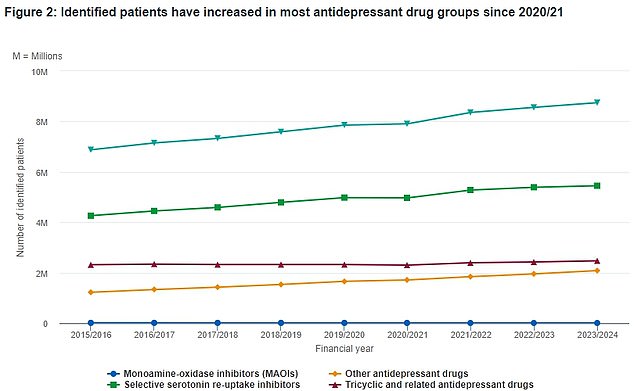Patients who are gradually withdrawn from antidepressants may be much more likely to suffer debilitating side effects than research suggests, experts said today.
It has long been known that these powerful drugs, taken by millions of people, can cause symptoms such as dizziness, headaches, insomnia and nausea when stopped.
But a major study in June said these withdrawal symptoms were not as risky as feared, with only one in six people on average experiencing them when they stopped taking the pills.
And only two to three percent suffer severe symptoms, according to results published in The Lancet Psychiatry.
However, researchers in Brazil and the UK said today that the paper “significantly reduced” the risk, with the figure actually being up to four times higher.
It has long been known that these powerful drugs, taken by millions of people, can trigger symptoms such as dizziness, headaches, insomnia and nausea when stopped.

This NHS data shows the number of Britons taking each type of antidepressant medication over the past eight years. The line with the green triangles indicates the total number of patients.
The use of antidepressants has skyrocketed in recent years, despite growing debate among experts about the drugs’ effectiveness in treating depression.
In the June study, scientists in Germany evaluated 79 studies involving more than 21,000 patients who were prescribed a variety of antidepressants.
They found that 15 percent of users experience one or more complaints directly caused by stopping taking the pills.
Of the 11 separate antidepressants, citalopram, sertraline and fluoxetine (the most widely used in the UK) had the lowest odds of withdrawal symptoms.
Stopping taking imipramine, paroxetine and venlafaxine was also associated with a higher risk of severe symptoms compared with other antidepressants, they said.
But Professor John Read, from the University of East London, and Dr James Davies, from the University of Roehampton, said today that “at least half of people suffer withdrawal symptoms”.
Writing in The Lancet PsychiatryThey said the researchers “based their own estimates primarily on studies with an average duration of 25 weeks, and nearly half of the included studies assessed antidepressant use for only up to 12 weeks.”
However, the typical antidepressant user takes these medications for several years.
They added: ‘Although future research will determine which of the two estimates is more accurate, between 1.2 million (15 per cent) and 4.7 million (56 per cent) of the 8.7 million people prescribed antidepressants in England alone last year will experience withdrawal effects when they try to reduce or stop taking antidepressants.
‘NHS England recommends the development of services to help people safely come off psychiatric drugs, but downplaying the effects of withdrawal may reduce the likelihood of this happening.’
Previous research conducted in 2019 by both authors also suggested that 56 percent of patients may experience such side effects.
In a second criticism, scientists at the Federal University of Ceará in Brazil also said the study has “certain flaws,” including its “short observation period” to assess discontinuation symptoms.

Singer Lewis Capaldi has been candid about his struggle with the side effects of antidepressants, describing problems with sexual dysfunction.
Nearly a third of the 79 studies analysed also failed to use “validated instruments” to assess antidepressant discontinuation symptoms, they added.
“The emergence of antidepressant discontinuation symptoms is a relevant area of study, but it is unclear to what extent these symptoms occur,” says the The researchers said.
The latest NHS data shows that a record 8.7 million people in England, about 15 per cent of the total population, are currently taking mood-boosting medication.
This represents an increase of 26 percent compared to the 6.8 million who were taking these drugs eight years earlier.
The proportion of the population taking antidepressants reaches one in four in some parts of the country.
Women aged 55 to 59 were the largest demographic group using medications, accounting for about one in 20 of the total.
However, medications such as antidepressants may also be prescribed for other health problems and this would be included in the data.
These include irritable bowel syndrome (IBS) and pain relief. They may also sometimes be prescribed to treat pain.
Selective serotonin reuptake inhibitors (SSRIs) remain the most common class of antidepressant drug in the UK, a position they have held for years.
Common SSRIs prescribed in the UK include citalopram, fluoxetine and sertraline, sometimes known by the brand names Cipramil, Prozac and Lustral.
But researchers have linked its use to long-term and even permanent sexual dysfunction.
The NHS has warned that side effects such as loss of libido and ability to orgasm, lower sperm counts and erectile dysfunction “can persist” after taking them, with patients describing feeling “left out” and having relationships ruined by their use.
Most doctors and the NHS consider that SSRIs are worth using for depression, especially in persistent or severe cases, given the debilitating nature of the illness.
Large-scale studies have found that the pills reduce symptoms of depression in 40 to 50 percent of those who take them.
The libido-reducing nature of SSRIs came to light last year thanks to Scottish singer Lewis Capaldi.
In a completely nude Netflix documentary, he spoke about taking it to help treat his anxiety and sadly commented on the domino effect it had on his sexual health.
“They’re not really doing anything except I can’t get an erection to save my life,” he said.

